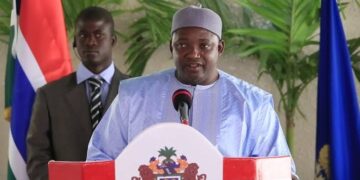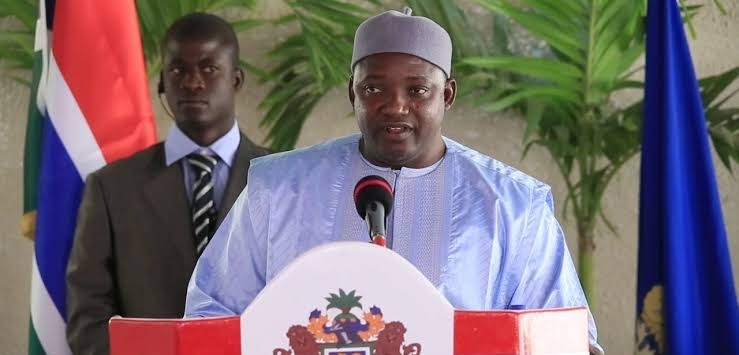By John Ikani
The President of The Gambia, Adama Barrow, has explained why the Economic Community of West African States Mission in Gambia (ECOMIG) which paved the way for his rise to power still maintain presence in the West African country.
Background
Barrow defeated Dictator Yahya Jammeh in 2016 to become the country’s third President, but Jammeh declined to relinquish power.
ECOMIG was mobilised then in the heat of the constitutional crisis sparked by the disputed Presidential election.
Barrow was eventually sworn in as Gambia’s President in January 2017.
The ECOWAS bloc would later agree to extend the mission after Mr Barrow asked that the mission, which paved the way for his rise to power, continue its work for one more year.
However, concerns have been raised by some Gambians over the continued stay of the ECOWAS troops since 2017.
What President Barrow is saying
Speaking on Tuesday afternoon at a press conference held at the State House in Banjul, the Gambian capital, Barrow stressed that the ECOWAS soldiers were a stabilising presence in the country.
According to him, the ECOWAS mission in the country is largely misunderstood by the people, adding that the mandate was beyond the removal of Jammeh.
He said: “I think the people are misunderstanding the mission of ECOWAS in this country. The ECOWAS is (was) not just here to get Yahya Jammeh out. No. You know when I was coming, our security sector was really polluted and we needed to address the security sector, and we needed to reform.
“Part of those reforms: we needed a back-up force to support us. Part of those reforms also is training. Right now, most of the state guards, we are training them outside. We still didn’t get the number we wanted for State House. We are still limited. Also part of our reforms, we have always been talking about downsizing; they say we should not say downsizing but rightsizing. In rightsizing we needed to audit, and this is the first time we are auditing the security sector.
“In the process we need to profile, and it’s the first time that we are profiling. As we profile, we move to rightsizing, as we are doing that, we need a back-up force to do all these processes. All these things are going on simultaneously. It’s not easy to do these things. I didn’t believe that after fifty years, we don’t even have a security policy. There was no security strategy; there was no military policy in this country. It’s all drafted now. There are processes to follow.”
Barrow explained that the processes took time, hence, the continued stay of the ECOWAS troops in the country.
“We needed the backup forces; and this is not the only country that has foreign forces,” Mr Barrow said.
“It has happened in many countries. In Liberia they were there for twelve years. In many other countries…Guinea Bissau.”
Barrow also explained that contrary to the widespread insinuation that the country “was paying heavily for the mission’s continued stay the country does not pay for it.”
“These are forces from ECOWAS; the Gambia is not even paying for it. They are here to support us. It’s just like for example, you are working on your farm, somebody came and says I want to help you on your farm for free and you are still complaining,” he explained.




































